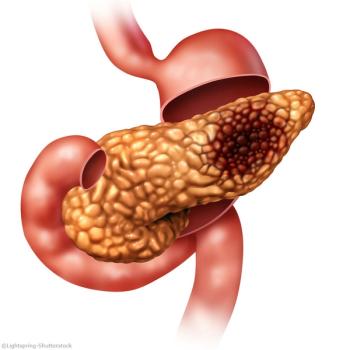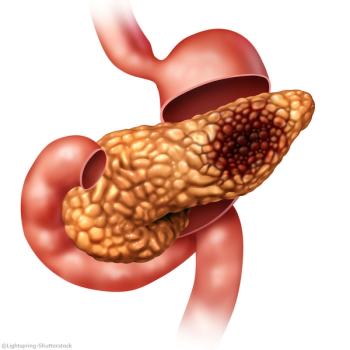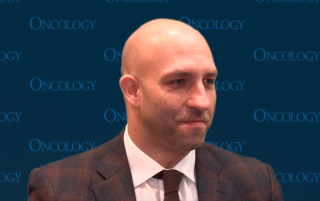
Pancreatic Cancer
Latest News
Latest Videos

CME Content
More News

The phase 2 EA2186 trial was the first elderly-specific clinical trial evaluating chemotherapy in vulnerable adults with metastatic pancreatic cancer.

Updated phase 2 results support further investigation of surufatinib plus TAS-012 in a larger cohort of patients with pancreatic ductal adenocarcinoma.

Investigators are assessing treatment with ELC-100 among patients with pancreatic neuroendocrine tumors as part of a phase 1/2 trial.

The decision follows safety data from the phase 1/2 LOKON001 trial evaluating LOAd703 in advanced pancreatic ductal adenocarcinoma.

Investigators of a phase 2a trial plan to include additional combination arms assessing treatment with IMM-1-104 across different patient populations.

No dose-limiting toxicities were observed with upamostat combination therapy in patients with metastatic pancreatic cancer.

Gemcitabine plus capecitabine was found to elicit longer survival outcomes than capecitabine alone in patients with pancreatic adenocarcinoma.

AI may open pathways to locate pancreatic cancer earlier and in higher-risk patient subgroups, according to Debiao Li, PhD, and Stephen Pandol, MD.

An artificial intelligence model may help move patients into treatment pathways for pancreatic cancer quicker, says Russell C. Langan, MD, FACS, FSSO.

In an era where medical records are digitalized, artificial intelligence has the potential to identify patterns that can locate at-risk patients with pancreatic cancer.

The rare nature of pancreatic cancer makes identifying it difficult, but progress towards earlier identification is being made, according to Brian M. Wolpin, MD, MPH.

Zenocutuzumab is now approved for patients with NRG1 fusion-positive NSCLC or pancreatic adenocarcinoma.

The relatively inexpensive nature of liquid biopsy may allow for more frequent screening among individuals who are at risk of developing pancreatic cancer.

There are certain markers that can point to a greater risk of pancreatic cancer like BRCA1/2, and diabetes, according to Brian M. Wolpin, MD.

The pancreatic cancer field may not be far from seeing the use of non-invasive blood tests in pancreatic cancer, said Ajay Goel, PhD, AGAF.

Tumor treating fields with chemotherapy improved overall survival for patients with unresectable, locally advanced pancreatic adenocarcinoma.

Only a few groups of patients get screened for pancreatic cancer, those with a genetic risk or pancreatic cysts among them, which can increase lethality for unidentified populations.

The development of RAS-directed vaccines may help decrease the likelihood of disease recurrence in patients undergoing treatment for pancreatic cancer.

A nurse practitioner discussed risk factors, diagnostic challenges, and treatment planning in patients with pancreatic cancers.

Shubham Pant, MD, MBBS, highlights how pan-RAS inhibitors, RAS-directed vaccines, and biomarker testing can improve outcomes in pancreatic cancer.

Tanios S. Bekaii-Saab, MD, provides an overview of current therapy options and ongoing initiatives involving targetable alterations in those with pancreatic cancer.

Immunotherapy options like CAR T-cell therapy and antigen-presenting cell-directed agents are currently being evaluated in the pancreatic cancer field.

Pancreatic cancer is projected to become the second-leading cause of cancer-related deaths by 2030 in the United States.

The incorporation of palliative care specific to mental health services and therapy remains underutilized in the care of patients with pancreatic cancer.

A nurse practitioner gives a closer look into the risk factors, diagnosis, adverse effects, and future treatments associated with pancreatic cancer.









































